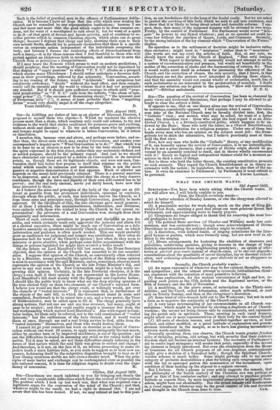25th August 1852.
Sr—In fulfilling my duties of late as an elector of Diocesan Proctors, I proposed to myself these two objects-1. Whilst we rendered the elective process more than a sham, which courtesy only could call solemn, to try and evidence to the world that clerics could meet for purposes grave and exciting, without strife and disorder; 2. To try and return men who by judgment and temper might be equal to whatever is before Convocation, be it action or dissolution.
I mention this, because over and above, and perhaps even before, and ra- ther than, the direct ends which may employ Convocation, and answer your correspondent's inquiry as to "What Convocation is to do ? " that which was to be done by us as electors is now to be done by the body elected. I think the spirit expressed in the first object, rather than any accurately-defined end or settled purpose, should be the primary regard. And just as we should have obstructed our real purport by a debate on Convocation or its involved points, so, though these are its legitimate objects, and were not ours, Con- vocation itself had better first propose to itself that retainer on the public mind which results in calmness and moderation. This is not the mere passive or negative demonstration it at first appears. Much of ulterior use depends on the moral hold previously attained. There is a general assertion to be disproved, and a new feeling excited that the clergy as a body deserve confidence, though the force and dignity of their own self-control has to be proved ; and the real body clerical, never yet fairly heard, have now this issue intrusted to them.
As I believe the aims and principles of the body of the clergy are as dif- ferent as possible from the prominent individuals, episcopal or capitular, through whom the public, as such, has heretofore known the Church, so I hope these aims and principles may, through Convocation, possibly be made apparent. Of the likelihood of this, the late elections gave much promise ; for at those I attended, the unreasonableness, indiscretion, and littleness, were entirely with those who wished to keep the Church in her unreal re- presentation : the advocates of a real Convocation won strength from their equanimity and information. Short of such extreme operations in property and discipline as you de-
scribe, and which certainly could only aggravate the jealousy and alarm felt at a clerical executive, there might be much use of Convocation as a deli- berative assembly on questions exclusively Church questions, and on which information and guidance is often much needed. This use would probably grow as confidence for judgment and temper was established. How often do measures halt for want of the Church's opinion ! how often do they seem to miscarry or prove abortive, when perhaps some fuller acquaintance with the things or persons legislated for might have secured a better result !
On the debate on Lord Blandford's bill last session the Home Secretary
objected, that the opinion of the Church was essential to its due consider- ation. I suppose that opinion of the Church, so conveniently often referred to by a Minister, means practically the opinion of the Bishop whose opinion is most in accordance with the said Ministers, and so, sometimes, about as much represents the opinion of the Church as the late Prime Minister's did, and never in any real sense is it. Now Convocation might be a body really ex- pressing that opinion. Certainly, in the late Proctorial elections, it is the clergy's own fault if their opinion is not represented in the Lower House. Lord Blandford's bill dealt mainly with the Episcopal and Capitular bodies ;
I should like the public truly to know what are the deep stirring opinions of the true clerical body on those two elements of our Church's outward form.
I believe you would see that the clergy could, or willingly would, get over the obstacle of "vested interests." It is rumoured that, in furtherance of the objects of the said bill, to which the Government stand in some sort committed, Southwark is to be raised into a see, and a true pastor, the Vicar of Kidderminster, may be called upon to fill it. The clergy generally have strong notions, that not one see and one true overseer, but many, ought at once to be created ; and they could readily supply a measure free from the bad workmanship which marred Lord Blandford's. Also with regard to Capi- tular bodies, let them only be referred, not to the cold erastionism of "vested interests," but the enthusiasm of the body clerical, and it would rescue them at once, through use and a real living service to God, alike from the "vested interests" themselves, and those who would destroy them.
I cannot let go your remarks last week on doctrine as an object of Convo-
cation without one word. Of course, to apply more stringently the test-screw, either by another turn or by improved machinery, is out of the question : nor can the difficulties be denied in assuming any creed as the ruling faith of the nation. Yet it may be asked, are not those difficulties simply inherent in the forces of that nature which the said faith was given to correct and change ? And therefore, is it not, on the face of it, an inverse proceeding to make ob- jective truth a mere Lesbian rule, as you seem to suggest as at least now ne- cessary, fashioning itself by the subjective disposition brought to bear on it ? Your closing sentences startle me into even a stouter mood. When the prin- ciples of mere barter and exchange can be contemplated even as possibly the sole national cement, it is time for religious dogma to doubt even the expe- diency of concession.


























 Previous page
Previous page